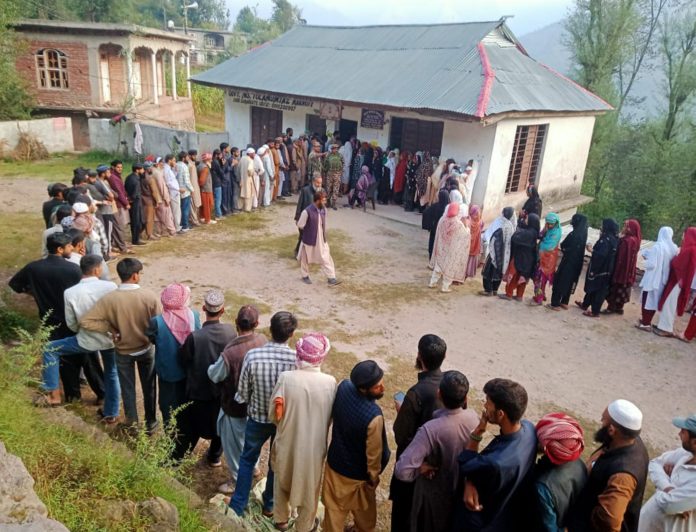Sapna Kotwal
The recently concluded assembly elections in Jammu and Kashmir marked a historic shift, as the Election Commission of India (ECI) ensured a violence-free, incident-free process, highlighting the J&K’s new chapter of peace and democracy, leading to a voter turnout even higher than the Lok Sabha elections held earlier this year.
Through a combination of tight security, strategic planning, and voter education initiatives, the elections were conducted smoothly, despite the challenges that historically surrounded the region’s electoral processes. It is safe to say that these elections were the most peaceful elections in the history of the region, with no incident of violence reported from any of the constituencies.
The Jammu and Kashmir Chief Electoral Officer Pandurang K Pole implemented a comprehensive framework that involved deploying extensive security forces across the polling areas, closely monitoring the electoral environment, and taking proactive measures to prevent any incidents of violence. The elections were conducted over three phases, covering all districts of the Union Territory, ensuring that polling was conducted in an atmosphere of peace, without any significant disruptions.
The smooth conduct of the elections is attributed to ECI’s and CEO’s meticulous security arrangements, supported by the Jammu and Kashmir police, the Indian Army, and other security agencies. All sensitive polling areas were identified well in advance, and special measures, such as setting up three-tier security zones, were put in place to ensure the safety of both voters and candidates. The security forces also maintained strict vigil along the Line of Control (LoC) to prevent any cross-border threats, further solidifying the peaceful atmosphere.
The General Observer for these elections praised the joint efforts of law enforcement agencies, stating that “all security measures ensured the elections were peaceful and the democratic process was carried out without any major hindrance.”
To boost voter participation and reduce any sense of apathy, ECI and CEO office also heavily relied on Systematic Voters’ Education and Electoral Participation (SVEEP) programs. These activities played a critical role in encouraging people to vote and educating them about the electoral process. The initiatives were focused on raising awareness, especially in remote areas, on the importance of voting and how to exercise their democratic right safely.
Voters were informed through multimedia campaigns, community outreach programs, and digital platforms, encouraging first-time voters, women, and marginalized communities to come forward.
These efforts contributed to a notable voter turnout, especially among young voters and women, with majority of the polling stations across the union territory reporting long queues from early morning.
One of the key voter education campaigns involved digital platforms that simplified the voting process, with information on polling locations, voting timings, and other essential details being widely shared. Special efforts were made to ensure access to PwD (Persons with Disabilities) voters, with dedicated help desks and transport facilities arranged for them to cast their vote without difficulty.
Another key highlight of this election was the participation of over 350 independent candidates, the highest since the 2008 assembly elections. This influx of independent candidates underscores the ECI’s commitment to providing a hassle-free process, with fair opportunities for all political players. The increased participation also reflects a new political awakening in Jammu and Kashmir, where individuals from all walks of life are keen to represent their constituencies.
Chief Election Commissioner of India Rajiv Kumar ensured that all candidates, irrespective of their political affiliations, had equal access to the election machinery and resources. Efficient systems were put in place to simplify the nomination process, while dedicated facilities ensured that each candidate could campaign without undue hardship.
With every constituency receiving ample coverage, the election machinery reached out to candidates with equal care and efficiency. This not only allowed for a more inclusive democratic process but also strengthened the people’s faith in the integrity of the electoral system.
The SVEEP campaign for the Assembly Election 2024 in Jammu and Kashmir represented a comprehensive and multifaceted approach to fostering electoral awareness and participation. Through a combination of traditional outreach methods, innovative activities, and the use of modern technology, the campaign successfully engaged a diverse electorate, ensuring that every eligible citizen is informed and motivated to vote.
An array of innovative ideas like rafting, adventure sports,paragliding, theme-based songs,NukkadNatak, Door to Door campaign and multiple other SVEEP activities attracted the Youth of J&K across the UT resulting huge turn out after 35 years.
A significant focus of the SVEEP campaign was on Kashmiri Migrant Voters, who are often disenfranchised due to displacement. The campaign sent over 23,000 SMS messages to registered Kashmiri migrant voters, encouraging them to participate in the election. These messages provided information on how to cast their vote, including details about postal ballots and special voting arrangements. Additionally, outreach programs were conducted in areas with high concentrations of migrant voters, providing them with the necessary information and support to ensure their participation, and the success of this endeavour reflected when J&K voted.
The peaceful conduct of the Jammu and Kashmir assembly elections is seen as a critical step toward further stabilizing the region, marking the first time since the abrogation of Article 370 that assembly polls were held without any major incident.
Voter turnout reflected growing confidence in the democratic process, while the presence of a record number of independent candidates showcased the political diversity and engagement of the local population.
The ECI, with its detailed security and voter outreach measures, has set a new standard for elections in Jammu and Kashmir, ensuring that democracy thrives in the region without any hindrance. This election exemplified how peaceful and fair elections can be held in the region with the right planning and execution.
(The author is the Nodal officer of Media for J&K UT and looking after the SVEEP activities)


